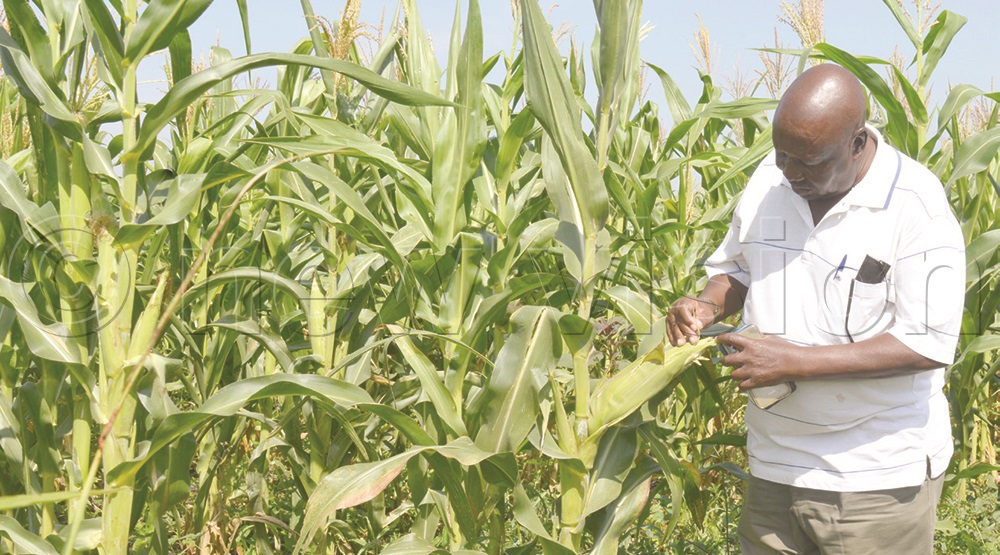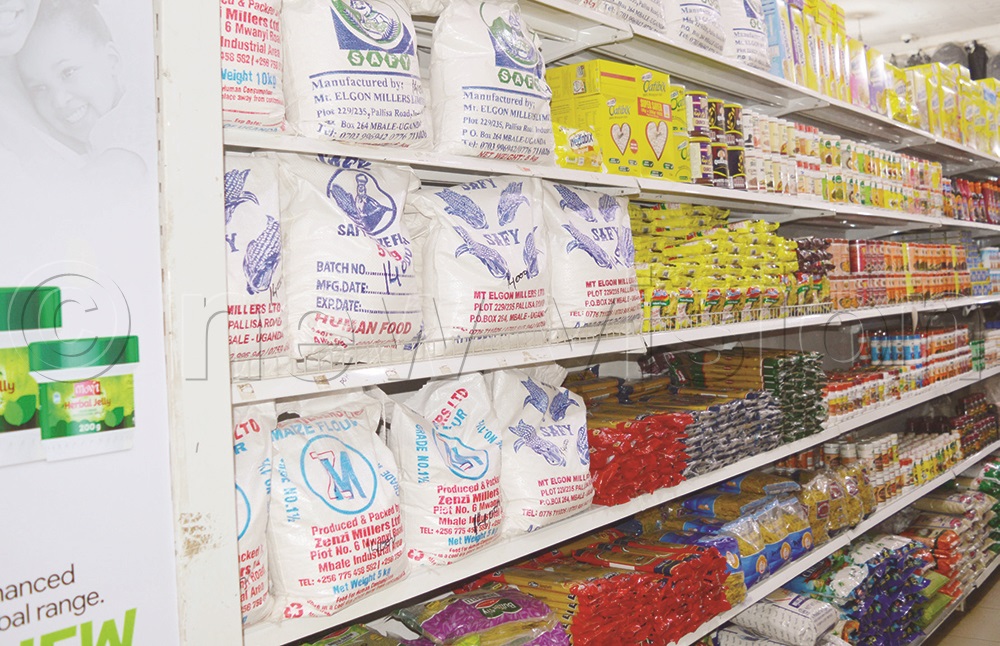By Julius Odeke
For the ninth year running, Vision Group, together with the Embassy of the Netherlands, KLM Airlines, dfcu Bank and Koudijs Nutrition BV, is running the Best Farmers Competition.
The 2024 competition runs from April to November, with the awards in December. Every week, Vision Group platforms will publish profiles of the farmers. Winners will walk away with sh150m and a fully paid-for trip to the Netherlands.
On a bright but cloudy Sunday morning, we were welcomed by flowering maize that bloomed on an expansive farm lying along the Sironko-Nakapiripirit highway in Bulambuli district. It is Stephen Wekomba’s 1,000-acre maize farm.
The maize farm cascades from the swampy areas of Bwikhonge’s wetlands touching the borderline of Bukedea district in the north.
The farm is bound by barbed wire — maize is planted in blocks. All of them are marked with numbers, while others have alphabetical letters, depending on planting date and maturity.
Genesis
Stephen Wekomba dropped out of school after completing O’level.
“My father advised me to stay home and help him supervise the family farms as the eldest child. I did so because life was glorious. My father almost had everything,” he says.
In 1985, he left the nest, starting his own farming business on a small scale. Although he is a resident of Simu sub-county, he bought chunks of land in the neighbouring Bwikhonge sub-county, where he cultivates maize and Arabica coffee.

He also keeps livestock on a commercial scale. Wekomba also has six tractors that help him till the land and mills that process the maize into flour.
He also owns 900 Friesian cattle paddocked on the same farm with each one tagged. Additionally, Wekomba has 980 acres of land in Masindi district, Bunyoro sub-region.
“I keep cattle, goats and sheep on the Masindi farm,” he says. Wekomba uses a paddocking system to manage his livestock.
Processing maize
Wekomba runs a multi-million shilling plant — Elgon Millers. The milling factory is located at Doko cell, Namatala ward in Mbale city’s Industrial division.
In the factory, maize is processed into flour and bran which are also packaged there. On average, he processes 100 tonnes per day.
At the factory, trucks pass through a 30m yard packed with bags of maize flour en route to Kampala, Jinja, Soroti or Busia districts.
There are also individual customers, many of whom are either buying maize flour, chicken and animal feeds or grains from the various stores in the factory’s premises.
“Here, everybody is on their toes,” Annet Mugide, Wekomba’s daughter in charge of the maize flour warehouse, says.
Wekomba has 12 trailers and other vehicles to run the family business.

“I worked for all that you see here. Nobody has ever given me money to invest in this business,” Wekomba says.
He also supplies supermarkets and shops in the major trading centres in Bugisu sub-region.
The manager at Abrah Shopping Centre, Abraham Mataya, says: “We have a business agreement with Elgon Millers, where we buy flour worth sh10m every month.”
The biggest customers of Wekomba’s flour are individual consumers. Institutions like schools, hospitals and the defence ministry also buy the flour.
The Ministry of Defence and Veteran Affairs, according to Wekomba, buys 12 tonnes of maize flour every month from his Mount Elgon Millers.
In Mbale, for example, Mbale SS, a school with a total population of 4,600 students, according to the deputy headteacher, Nasibu Mutyaba, is a regular client of Wekomba’s maize flour.
Mutyaba says: “As a school, we buy at least 30 bags of flour at a cost of sh300,000 per bag for our students per term.”
Why he chose maize
“I chose to grow maize after my father did so on a large scale in the 1960s, 1970s and 1980s before he died.
“Our home was a home of maize and you would see many people come home just to eat either roasted, boiled maize or posho.”
In the past, labour was not as commercialised as it is today. Provided you gave labourers’ food and brew, nobody would bother asking for money, he quips. The hard-hitting living conditions have forced things to change.
“I treasure people around me for they are instrumental in my businesses, especially in tending to my maize. I pay them besides giving them food,” Wekomba says.
In his compound, about 20 people sat leisurely under the mango tree waiting to be paid for the week’s work. Gibson Gimei, 68, a neighbour, was paid sh300,000.
“My family and I have been engaged in Mzee’s farm. He always comes home on Sunday to pay us,” he says.
Emmanuel Bogere, 47, was given sh120,000 for his labour. Young people were spread at the compound threshing beans and maize while packing the products in polythene bags.
Wekomba looked straight into my eyes and told me: “If I didn’t have the help of the locals, it would have been difficult to run the farm.”
The Bulambuli district agricultural officer, Joel Wamboza, says: “We have Chinese investors here who grow a lot of maize but theirs is purely for export, unlike Wekomba who grows maize for domestic consumption.”
Busy bee at the farm
Everybody on the farm has an assignment from which they earn a livelihood.
“I routinely come to this farm on Sundays to monitor and assess the work done by my people,” he says.
The 1,000-acre farm is under the close supervision of the Simu sub-county LC3 chairperson, Michael Chunga Buyi. He is the farm supervisor.
“I spend sh3m to pay casual workers on the farm per day,” Buyi whispers. He says the number of casual workers reaches over 100 a day. Some of these are relatives, in-laws and friends. As a supervisor, Buyi says: “We always spend about sh6m on spraying maize crops to protect them against the fall armyworm.”
Free food to community
In all his homes, Wekomba offers food freely to his neighbours while educating the needy village children in the community using proceeds from maize.
A staunch Catholic, Wekomba seems to have read Deuteronomy 15:10, which states: “Give generously to them and do so without a grudging heart; then because of this, the Lord your God will bless you in all your work and in everything you put your hand to.”
Family, background
Wekomba desires to pass on the mantle to his children.
“I would have loved all my children to venture into agriculture for it’s the backbone of Uganda’s economy. However, that is up to them,” says the father of the former Bulambuli district woman MP, Sarah Nambozo Wekomba.
Wekomba has four wives with over 20 children and 28 grandchildren. Wekomba was born on February 2, 1954, to the late Daniel Maira and Joyce Maira in Simu village, present-day Bulambuli district.
He attended Butandinga Primary School and Masaba SS, where he sat his exams in 1975. In 1976, Wekomba scored a distinction in agriculture and wanted to go to A’level and then Makerere University for a bachelor’s degree in agriculture.
Challenges
Maize growing in Uganda is constrained by the presence of weeds like the wandering Jew (commelina diffusa), which has blue flowers and tradescantia albiflora with yellow-tipped stamens. There is also the blackjack, striga and oxalis (witchweed).
Wekomba says he also has to deal with striga, stemborers, fall armyworm, termites, leaf pyrosis and mycotoxins. He says these are manageable.
His challenges include a lack of stable electricity and high costs of production.
“The high interest rates on agri-financing are a great challenge to my farming activities. Sometimes, I need a loan to buy new machinery but the loans are expensive,” Wekomba says.
“Theft is no longer a threat because most of the people who work here appreciate my work. However, some pockets of misgivings from a few errant individuals still exist.”





